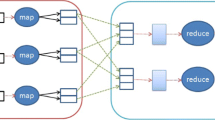Abstract
In social network analysis, graph-theoretic perceptions are used to realize and explain social experience. Centrality indices are essential in the analysis of social networks, but are costly to compute. An efficient algorithm for the computation of betweenness centrality is given by Brandes that has time complexity O(nm + n2logn) and O(n + m) space complexity, where n, m are the number of vertices and edges in a graph, respectively. Some social network graphs are invariably huge and dense. Moreover, size of memory is rapidly increasing and the cost of memory is decreasing day by day. Under these circumstances, we investigate how the computation of centrality measures can be done efficiently when space is not very significant. In this paper, we introduce a time efficient and scalable algorithm for the accurate computation of betweenness centrality. We have made a thorough analysis of our algorithm vis-à-vis Brandes’ algorithm. Experimental results show that our algorithm has a better performance with respect to time, but at the expense of using higher memory. Further performance improvement of our algorithm has been achieved by implementing it on parallel architectures.
Access this chapter
Tax calculation will be finalised at checkout
Purchases are for personal use only
Preview
Unable to display preview. Download preview PDF.
Similar content being viewed by others
References
HitWise Press Release (2006), http://www.hitwise.com/press-center/hitwiseHS2004/social-networking-june-2006.php
Wasserman, S., Faust, K.: Social Network Analysis: Methods and Applications. Cambridge University Press, Cambridge (1994)
Freeman, L.C.: Centrality in social networks: Conceptual clarification. Social Networks 1, 215–239 (1979)
Li, L., Alderson, D., Doyle, J.C., Willinger, W.: Towards a Theory of Scale-Free Graphs: Definitions, Properties, and Implications. Internet Mathematics 2(4), 431–523 (2006)
Everett, M.G., Borgatti, S.P.: Krackhardt. D.: Ego-network betweenness. Paper presented at the 19th International Conference on Social Network Analysis (Sunbelt XIX), Charleston, South Carolina (1999)
Ellis, A.R.: Using SAS to Calculate Betweenness Centrality, Connections: International network For Social Network Analysis, vol. 29, pp. 26–32 (2009)
Brandes, U.: A Faster Algorithm for Betweenness Centrality. Journal of Mathematical Sociology 25(2), 163–177 (2001)
Nichols, B.: Pthreads Programming: a Posix Standard for Better Multiprocessing. Ignatius Press, San Francisco (1996)
Vetter, S., Aoyama, Y., Nakano, J.: Practical MPI Programming. IBM Redbooks publication (1999)
Kintali, S.: Betweenness Centrality: Algorithms and lower bounds, arXiv.org>cs>arXiv:0809.1906 (2008)
Bader, D.A., Kintali, S., Madduri, K., Mihail, M.: Approximating betweenness centrality. In: Bonato, A., Chung, F.R.K. (eds.) WAW 2007. LNCS, vol. 4863, pp. 124–137. Springer, Heidelberg (2007)
Griesberger, R., Sanders, P., Schultes, D.: Better approximation of betweenness centrality. In: Workshop of algorithm engineering and experiments (January 2008)
Bader, D.A., Madduri, K.: Parallel algorithms for evaluating centrality indices in real-world networks. In: Proc. 35th Int’l. Conf. on Parallel Processing (ICPP 2006), Columbus, Ohio, pp. 539–550. IEEE Computer Society, Los Alamitos (2006)
Madduri, K., Ediger, D., Jiang, K., Bader, D.A., Chavarria-Miranda, D.: A faster parallel algorithm and efficient multithreaded implementations for evaluating betweenness centrality on massive datasets. In: Proc. 3rd Workshop on Multithreaded Architectures and Applications (MTAAP 2009), Rome, Italy, May 2009, IEEE Computer Society, Los Alamitos (2009)
Tan, G., Tu, D., Sun, N.: A parallel algorithm for computing betweenness centrality. In: Intl. Conference on Parallel Processing, IEEE Xplore (2009)
Tu, D., Tan, G.: Characterizing betweenness centrality algorithm on multicore architectures. In: IEEE Intl. Symposium on Parallel and Distributed Processing with Applications (ISPA), Chengdu, China (August 2009)
Author information
Authors and Affiliations
Editor information
Editors and Affiliations
Rights and permissions
Copyright information
© 2011 Springer-Verlag Berlin Heidelberg
About this paper
Cite this paper
Bhardwaj, S., Niyogi, R., Milani, A. (2011). Performance Analysis of an Algorithm for Computation of Betweenness Centrality. In: Murgante, B., Gervasi, O., Iglesias, A., Taniar, D., Apduhan, B.O. (eds) Computational Science and Its Applications - ICCSA 2011. ICCSA 2011. Lecture Notes in Computer Science, vol 6786. Springer, Berlin, Heidelberg. https://doi.org/10.1007/978-3-642-21934-4_44
Download citation
DOI: https://doi.org/10.1007/978-3-642-21934-4_44
Publisher Name: Springer, Berlin, Heidelberg
Print ISBN: 978-3-642-21933-7
Online ISBN: 978-3-642-21934-4
eBook Packages: Computer ScienceComputer Science (R0)




